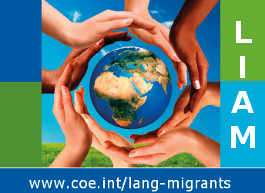Reference guide on Literacy and Second Language Learning for the Linguistic Integration of Adult Migrants (LASLLIAM)

Language skills foster, among others, social inclusion, and access to education and employment. Within this context, non-literate or low-literate migrants have specific educational needs, as they must learn a second language while either learning to read and write for the first time or developing basic literacy competences in an alphabet or writing system sometimes different from the one they will have learned initially.
When it comes to language or knowledge of society courses, these needs are rarely taken into consideration, and this group of migrants is rarely offered a sufficient number of hours to reach the language level required. This is why LASLLIAM has been conceived: it aims at supporting language educators, curriculum designers and language policymakers in their endeavour to design, implement, evaluate and improve curricula tailored toward the specific needs of the target learners.
 About the LASLLIAM conference, 30 June 2022, in Strasbourg and on-line
About the LASLLIAM conference, 30 June 2022, in Strasbourg and on-line
 Webinar “Literacy and Second Language Learning for the Linguistic Integration of Adult Migrants (LASLLIAM)”
Webinar “Literacy and Second Language Learning for the Linguistic Integration of Adult Migrants (LASLLIAM)”
On 14 January 2022 the Education Department hosted a Webinar to present a new reference guide for Literacy and Second Language Learning for Linguistic Integration of Adult Migrants (LASLLIAM).
About 400 participants, mainly language educators from different countries, including from outside Europe, attended the event, participating actively in an exchange with the authors.
The reference guide was developed by a group of experts and the Council of Europe Education Department to support high-quality learning environments for non- and low-literate migrants. Research has shown that when it comes to language or knowledge of society courses, the needs of this group of migrants are rarely taken into consideration, and they are rarely offered a sufficient number of hours of teaching to reach the language level required.
The authors explained how research was used to develop the guide aimed at supporting language educators, curriculum designers and language policymakers in their endeavour to design, implement, evaluate and improve curricula tailored towards the specific needs of the target learners. They also presented new visions of teaching literacy and second language and of assessing low-literate learners across Europe.
The pilot phase of the project is about to start, aimed at developing tools and scenarios referring to LASLLIAM. The reference guide will be launched at a Conference on the 30th of June 2022.
You can find the recording of the Webinar here, as well as the Presentations given by the experts.
Video of the webinar “Literacy and Second Language Learning for the Linguistic Integration of Adult Migrants (LASLLIAM)”
Opening and Welcome:
Presentation of the LASLLIAM Reference Guide by the authoring team
Discussion of the LASLLIAM Reference Guide and Q & A session with the authoring team
Next Steps (Piloting, Launching Conference, Dissemination):
Closing remarks:




